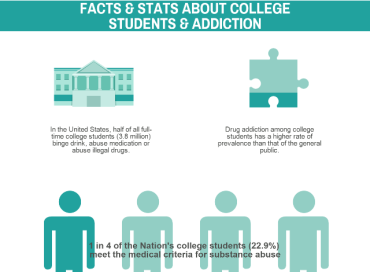The statistics are troubling enough: Every day, 115 Americans die from an opioid overdose. Every. Day.
But the statistics are nothing compared to losing a loved one to addiction—a child, a brother, a sister, spouse, mother, father— or student, roommate, or classmate at college. Because college campuses have not escaped this epidemic.
“The prime drug using years are late teenage, young adult age, the college age,” says Jerry Stahler, a professor in the Department of Geography and Urban Studies at Temple University and a member of the Temple Association of University Professions. “Kids experiment, they’re away from home, there’s less supervision, it’s very easy for students to start off with something and then lose control.”
Opioids introduce a whole new level of danger, he adds: The risk of overdose is much higher. “What’s been a terrible public health problem has turned the page and become a really deadly problem.”
Here is a typical trajectory: A doctor prescribes pain medication like oxycontin, Percocet or Vicodin is prescribed for an athletic injury, migraine or other common ailment. It runs out and withdrawal kicks in. The doctor refuses to refill the prescription, the patient goes doctor shopping for a new one, uses up all the options and turns to a street supply, often heroin and/or fentanyl, that is less expensive, readily available, and sometimes deadly. Another trajectory: Young people experiment with pain killers to get high, and wind up addicted.
The New York Times reported that opioid-related insurance claims from college-age patients at Blue Cross Blue Shield nearly doubled between 2010 and 2017. Up to 30 percent of college students have substance abuse disorders, Lisa Laitman told the Chicago Tribune. Laitman is the director of the Alcohol & Other Drug Assistance Program at Rutgers University, one of the leading centers of its kind.
Addiction is not news on college campuses. Alcohol use is a fixture of student life and drug use is common, from amphetamines like Adderall to study all night, to “Molly” and marijuana at parties. More than a third of full-time college students have engaged in binge drinking over the last month, reports the Substance Abuse and Mental Health Services Administration, and one in five has used an illicit drug.
Sobering options
Colleges have responded with programs to promote prevention—all those freshmen orientation sessions, for example—and in some cases treatment, referral and even support for students already in recovery.
One of the most effective programs has been addiction recovery housing, according to those who work in the field, where students struggling with addiction can live with others who are sober. That’s no small thing on college campuses, says Frank Greenagel, a member of Rutgers AAUP-AFT and a counselor who works with the Rutgers Recovery Housing program, regarded as one of the most successful in the nation. Students can be overwhelmed by a culture of excess, he says, and describe their peers this way: “If they weren’t getting high or drunk, they were talking about getting high or drunk, or about how high or drunk they got the night before.”
Recovery housing is similar to special interest dorms for athletes, international students and other groups, but they also include counseling, mentoring and social activities. “It was amazing,” says Morgan Thompson (pictured with Lisa Laitman), who called Rutgers Recovery Housing “key” to maintaining her sobriety. Thompson signed up when she was just four months sober and determined to beat her heroin habit. “I did really well academically. I had the support of the counseling and mentoring [including Greenagel]. But being around young adults who were in stable recovery, who were also pursuing their education was so important to me—first of all to believe that I could do it but also to develop a new group of friends, to find out I could have fun clean and sober.” At Recovery Housing there were parties and midnight trips to the beach – a typical college experience, she says—but without drugs and alcohol.
Thompson stayed in Recovery Housing for two and a half years, eventually moving off campus and graduating. In a few months she will get her master’s degree in social work. She’s written about her experience.
Ben Chin came to Recovery Housing from prison, where he’d served time for assault. His two years in the program provided the continuity he needed to stay sober, and was a stark contrast to earlier experiences. After three separate stints in substance abuse treatment centers, he’d been unable to stay sober when he returned to high school. “I was back in the same environment,” he told Rutgers Today.
“There was no peer group, no one also in recovery.” Chin went on to found the nonprofit Young People in Recovery.
Success stories like these are the happy endings, but there are plenty of tragedies as well. Many times, students with addiction disorders leave campus and no one knows why—or whether they survived their struggle. Other times, a fatal overdose becomes the catalyst for stronger prevention, treatment and recovery programs on campus.
What to do
At the very least, says Stahler, campus police and first responders should carry Naloxone (Narcan), which reverses opioid overdose if administered quickly. Second, campuses should provide addiction services such as counseling, treatment referral and help managing academic release, if students need to leave school for recovery, or other accommodations that might be necessary. Finally, colleges should have in place ongoing recovery services such addiction counseling, support groups, safe spaces and recovery housing to help students stay in school and graduate sober.
On a larger scale, advocating for better federal, state and local policy can help change a system that stigmatizes people with addiction disorders, limits the services available to them, and minimizes regulations on a multi-billion opioid industry profiting from deadly addiction.
For personal stories about addiction recovery on campus, see AFT Voices.
[Virginia Myers]


